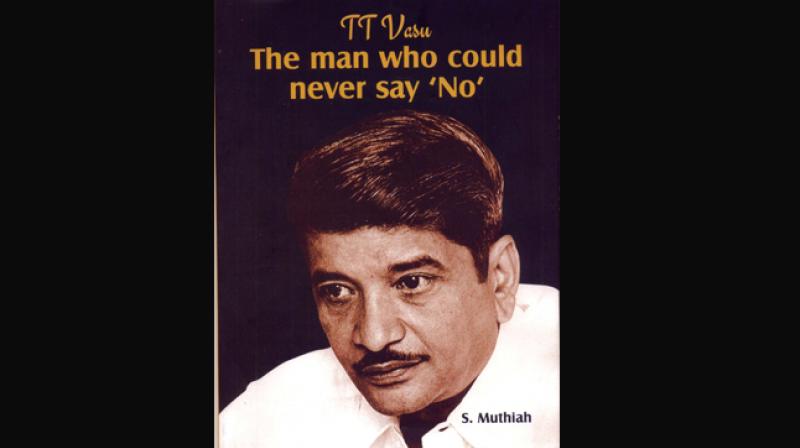Book review: Politics, family business and leadership

Chennai: Whether it is family business or politics, “being a Father’s son” can be both a natural advantage and an embarrassment. But one thing that comes through vividly in the recently published, phlegmatic and truthful memoir on T T Vasu, the last of the four sons of T T Krishnamachari, TTK as he was popularly known and who was one of Nehru’s most trusted ministers in the Central Cabinet in the 1950s’ till the mid-1960s’, by the eminent historian of Chennai, S Muthiah, is that there was a ‘TTK legacy’ that drew a ‘lakshman rekha’ between the two realms. It remains relevant to this day, as more political parties and business houses confront this uneasy coexistence.
“In his day, TTK was a powerful Minister in the Central Government. In many of the ministerial posts he held, he could have helped his sons. In other posts, a word to the right official would have helped the sons’ business. But that was an era of rigid rectitude and the one occasion TTK decided to help someone, not only was the person not a son, but he paid the price of the age: he had to resign from office,” writes Muthiah in his lucidly presented memoir on T T Vasu. The only such over-reach by TTK, Muthiah has obliquely referred to, is the Mundhra controversy.
The Left, spearheaded by the late lamented A K Gopalan and the Lohia Socialists, in and out of Parliament were virtually gunning for TTK those days for his alleged nepotism though TTK had given up all his business interests as early as 1941, before he fully plunged into politics and got elected to the Central Legislative Assembly in Delhi on a Congress ticket from Tamil Nadu. The company TTK had built had ‘successful distributorship’ for several consumer items before he bequeathed his business to his sons.
Muthiah quotes extensively from a letter TTK wrote to his eldest son, T T Narasimhan, in December 1956, how since he assumed office, he had already issued instructions to his office that any decision or exercise of discretion bearing on his son’s business concerns which might come under the purview of his (TTK’s) Ministry, will not be permitted and “the matter is to be referred to the Prime Minister.” It was in this backdrop that T T Vasu wrote to the then Lok Sabha Speaker in April 1965, as the issue snowballed into a big controversy in Parliament, to show how the allegations of favouritism in granting licences to some of the new ventures by the TTK Group were totally baseless.
“We are conscious of the fact that T T Krishnamachari & Co bears the name of our father, who is in politics and we should do nothing in the course of our business which would in any manner reflect on our father’s position,” wrote Vasu to the Speaker, which the author has quoted fully. It remains a model lesson even now, more so with economic liberalisation when line between politics and business interests gets thinner by the day. This in itself is a very valuable historical contribution by the author in retelling Vasu’s story as a multi-faceted genius, despite the liberties the youngest son in the family took.
In a coffee-table memoir of T T Vasu, with a liberal sprinkling of exquisite and rare pictures that is also a window to the cultural life of old Madras since the 1950s’, Muthiah’s narrative is not strictly chronological. Rather, he has, in measured pauses, brought out continuity, change, tolerance, spirit of accommodation and vignettes of street-smart humour and quality of helping other people unmindful of risks in this amazing person’s life and times, as he focuses on different facets and roles of the late Vasu.
From the TTK family being a “fractured” one, Vasu’s years of youth, how he was even a journalist in his younger days with the ‘Indian Express’ in Delhi without people knowing he was TTK’s son, the blossoming of romance between Vasu and Stina, the Swedish woman whom he married later, interacting and convincing ‘babus’ in Delhi in the heyday of the ‘Licence Raj’ when TTK and Co. was transforming itself into a manufacturing group, focusing in segments like cosmetics, pharmaceuticals, condoms and so on, besides other interests like publishing (TT Maps with a German partner), forays into the hospitality business, to Vasu’s perhaps most eventful days as President of the ‘Music Academy’, the range and passion that drove the protagonist is mind-boggling.
And yet, Vasu for all his reverential attitude to our cultural and musical traditions, was in his Loyola College student days a movie buff, glued to Hollywood and British films and a great admirer of Errol Flynn, points out Muthiah in recapitulating his early sensibilities that shaped Vasu’s catholic and more liberal outlook to life. “His love for popular Western music, he passed on to his children,” writes Muthiah. There may again be a contemporary relevance to this facet in the days of rising social and cultural insularity.

